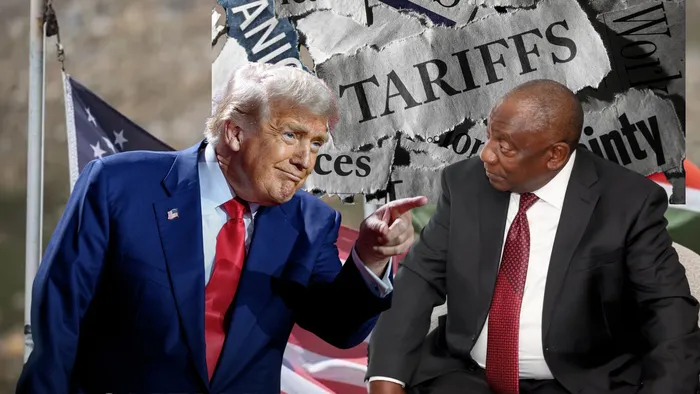South Africa faces economic repercussions from new US tariffs

The Portfolio Committee on Trade, Industry and Competition has expressed deep concern over the impending 30% import tariff that the United States plans to impose on certain South African exports, effective from August 7.
Image: IOL Graphics/Se-Anne Rall
The Portfolio Committee on Trade, Industry and Competition has expressed deep concern over the impending 30% import tariff that the United States plans to impose on certain South African exports, effective from August 7.
This significant development has raised red flags about the potential repercussions for key sectors of the South African economy.
During a recent meeting in June, the committee engaged with the Department of Trade, Industry and Competition (DTIC) to assess the state of South Africa's trading relationship with the US, as well as with other international partners.
The newly announced US tariffs, which will affect multiple countries alongside South Africa, have serious implications for strategic sectors such as automotive, agriculture—particularly citrus—and steel, all integral to South Africa's economic fabric and job market.
Historically, South Africa has enjoyed a robust trade relationship with the United States, which stands as the country's second-largest trading partner.
In 2024, South African exports to the US accounted for approximately 8% of the nation’s total global exports, valued at around R156.6 billion. This export composition is telling, with around 43% comprising manufactured products, predominantly autos and vehicle components, alongside mining commodities (50%) and agricultural goods (7%).
As the largest importer of US goods in sub-Saharan Africa, the South African economy has been bolstered by mutual trade benefits, generating a trade surplus with imports valued at about R120.2 billion in 2024.
This partnership has fostered an environment where over 600 US companies, including prominent names like Ford, Coca-Cola, and Google, operate in South Africa, contributing to job creation on both sides: 132,000 jobs in South Africa and 7,000 in the US from South African corporations.
In light of the new tariffs, the committee has raised alarms regarding the direct impact on the competitiveness of South African exports.
The additional tariff will likely inflate prices for South African goods in the US market, potentially eroding demand and disrupting established value chains. Such changes could lead to declines in local production and significant job losses if alternative markets cannot be secured.
There is also concern over how the tariffs may alter the current composition of South African exports.
With approximately 43% of South African goods destined for the US being manufactured products, any reductions in this sector could pose severe challenges, especially when compared to the 38.7% of global exports that consist of manufactured goods.
To mitigate these risks, South Africa recently introduced the “Butterfly Strategy,” aimed at fostering industrialisation and diversifying trade partnerships.
Key components of this strategy include a focus on product and market diversification, enhanced trade negotiations, and streamlined protocols to adapt to global challenges. The committee, alongside the government, urges renewed negotiations with the US, emphasising the crucial need for a viable trade and investment agreement to tackle ongoing issues.
Mzwandile Masina, Chairperson of the committee, remarked on the importance of unity during this critical tipping point in negotiations.
“All South Africans should partner with government and speak with one voice during this critical period,” he urged.
As various global players also face similar tariff concerns, maintaining a cohesive strategy is vital to safeguard South African economic interests.
In a landscape marked by disruption, the South African government and its committee remain committed to engaging with US counterparts to avert any adverse effects of these tariffs, thus reinforcing the importance of the bilateral trade relationship and seeking avenues for mutual growth and development.
IOL
Related Topics: